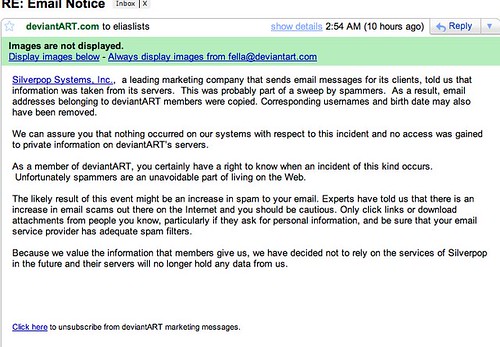The headlines today show a data breach of the Gawker media group.
Separately, I today received an email from a web service that I once signed up to but don’t use. The notice says my data has been compromised.
In this case, a partner of deviantART.COM had been shared information of users and it was compromised. Thankfully, I used one of my disposable email addresses so I will not be affected by the spammers. (I create unique email addresses for sites I don’t know or trust, so that I can shut them off if need be.)
But this once again raises the question: why did this happen? Or rather, how did we let this happen?
Delegated authentication and identity management
What was interesting about the Gawker incident was this comment that “if you logged in via Facebook Connect, in which case you’ll be safe.”
Why safe? For the simple reason that when you connect with Facebook Connect, your password details are not exchanged and used as a login. Instead, Facebook will authenticate you and notify the site of your identity. This is the basis of the OpenID innovation, and related to what I said nearly two years ago that it’s time to criminalise the password anti-pattern. You trust one company to store your identity, and you reuse your identity in other companies who provide value if they have access to your identity.
It’s scandals like this remind us for the need of data interoperability and building out the information value chain. I should be able to store certain data with certain companies; have certain companies access certains types of my data; and have the ability to control the usage of my data should I decide so. Gawker and deviantART don’t need my email: they need the ability to communicate with me. They are media companies wanting to market themselves, not technology companies that can innovate on how they protect my data. And they are especially not entitled for some things, like “sharing” data with a partner who I don’t know or can trust, and that subsequently puts me at risk.
Facebook connect is not perfect. But it’s a step in the right direction and we need to propel the thinking of OpenID and its cousin oAuth. That’s it, simple. (At least, until the next scandal.)

